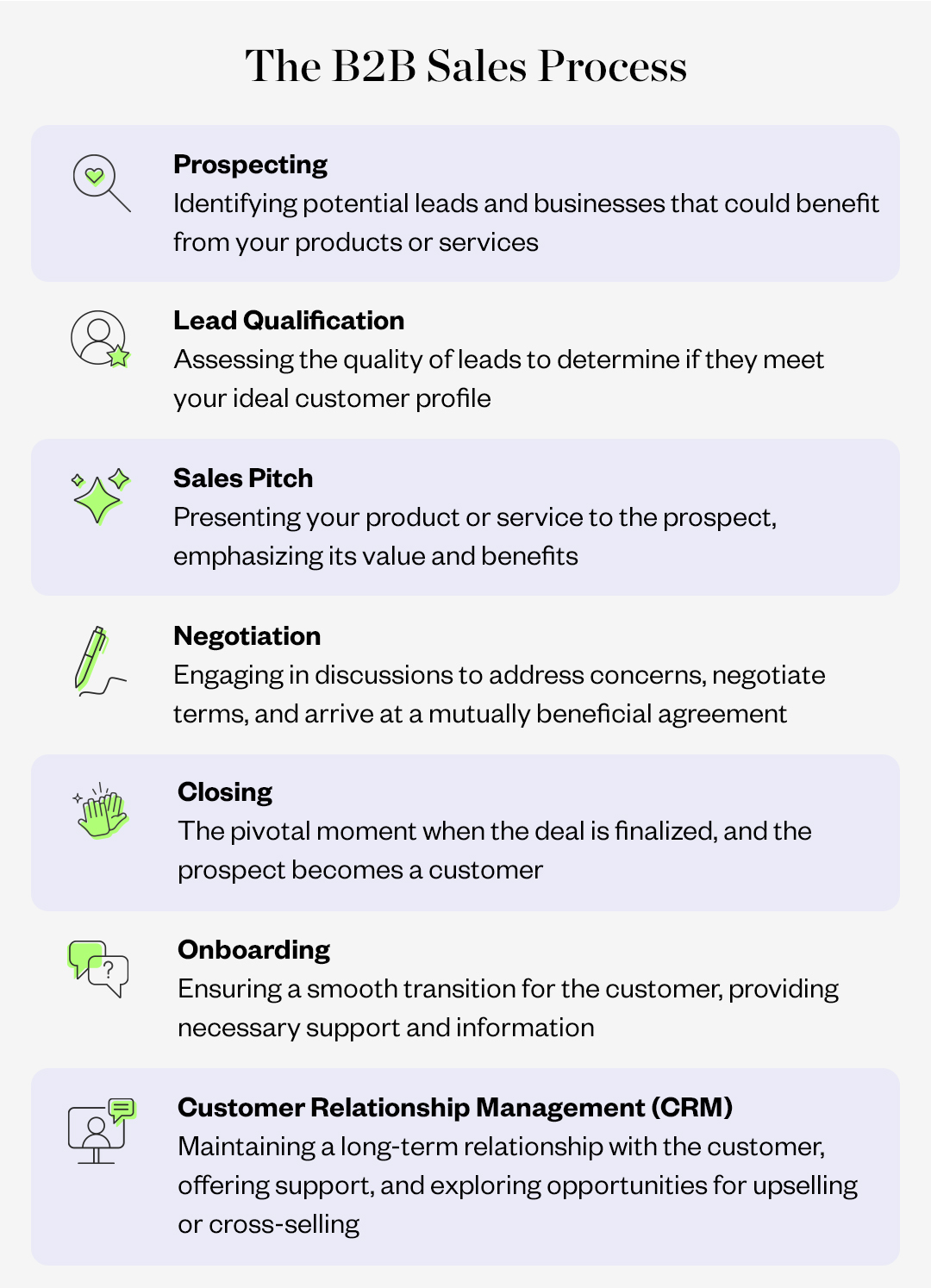What is B2B sales?
Get the guide to B2B sales to learn the basics of B2B selling and strategies for success from the experts at NuORDER.

The intersection of business relationships is a complex realm of contemporary B2B eCommerce known as B2B sales. In this comprehensive guide, we'll delve into the intricacies of B2B sales, explore its real-world applications, and examine how it compares to B2C sales. Along the way, we'll uncover the B2B sales process, discuss commonly faced challenges in the B2B space, and equip you with effective strategies for succeeding in this complex discipline.
What is B2B sales?

B2B sales involves the art of selling products or services from one business to another. It's the engine that propels industries, from manufacturing to software and professional services to wholesale distribution. In essence, B2B sales keep the corporate world operational.
Imagine a software solutions provider. Their team, equipped with innovative products and a profound understanding of the client's needs, engages in consultative selling.
They don't just offer software; they provide a tailored solution that addresses specific pain points, streamlines processes, and enhances productivity. This isn't just a transaction; it's a partnership built on trust and mutual growth. In the world of B2B sales, relationships matter, and every deal is a step towards a long-term collaboration.
B2C vs. B2B sales
While both B2B (business-to-business) sales and B2C (business-to-consumer) sales involve selling products or services, critical distinctions set them apart.
- Higher transaction value: B2B sales deals typically involve substantial financial transactions compared to B2C sales.
- Extended sales cycles: B2B sales often require patience, with prolonged sales cycles due to the complexity of decision-making within businesses.
- Multiple stakeholders: Multiple decision-makers, often from different departments, influence B2B purchase decisions.
- Educated buyers: B2B buyers are well-informed, seeking solutions tailored to their unique business needs.
In contrast, B2C sales are generally characterized by shorter sales cycles, lower individual transaction values, and a more direct, consumer-focused approach.
Navigating the modern B2B sales journey
The B2B sales landscape is evolving remarkably due to digital transformation. Today, the process encompasses various stages, adapting to the preferences of modern buyers who are tech-savvy, research-oriented, and value-driven.
The modern B2B sales journey begins with prospecting, where businesses identify potential clients based on criteria like industry, size, and needs. It then proceeds to lead nurturing, where personalized communication and engagement are key. Once delivered in person, the sales pitch is now often virtual, facilitated by video conferencing and tailored presentations.
Closing the deal requires finesse, negotiation skills, and the ability to address concerns effectively. Once the deal is sealed, customer retention becomes the focus, ensuring clients remain satisfied and engaged.
B2B sales process
The B2B sales process is a structured approach to turning prospects into customers. It typically consists of several key stages:

Challenges in B2B sales
While B2B sales offer immense potential, they also present their share of challenges. It's not a journey without hurdles. It's essential to approach this domain strategically and understand potential obstacles. Here are some common challenges faced by B2B sales professionals:
Competition
The B2B sales landscape is fiercely competitive. It requires businesses to establish their unique identity effectively. In this crowded arena, differentiation is not optional; it's imperative. It is crucial to craft a compelling value proposition that resonates with potential clients and effectively communicates what sets your offerings apart.
Complex decision-making
B2B transactions involve intricate decision-making processes, and B2B sales professionals must be able to skillfully navigate the needs of multiple stakeholders, each with distinct interests and concerns. Successful B2B sales professionals must adeptly engage these decision-makers and continuously drive decisions while considering each party's individual roles, perspectives, and motivations.
Lengthy sales cycles
In B2B sales, patience and persistence are invaluable. Deals often take considerable time to materialize, sometimes spanning months or even longer. Effective B2B sales professionals remain steadfast and diligently nurture leads. Achieving a balance between immediate objectives and long-term deal closures requires a meticulous and strategic prioritization of relationship-building over hurried transactions.
Lead generation
Generating high-quality leads in the B2B sales realm calls for creativity and adaptability. Identifying businesses that align with your ideal customer profile and engaging them effectively is multifaceted. Effective B2B lead generation involves casting a wide net while focusing on high-potential prospects through various avenues, from leveraging digital marketing channels to active participation in industry events and networking.
Adapting to digital transformation
The digital age reshaped the landscape of business transactions and B2B sales. Getting up to speed on the digital shift is essential for the success of B2B sales. B2B sales teams must continually manage and consider emerging technologies, evolving channels, and shifting customer expectations. Staying attuned to emerging trends, implementing CRM systems, and harnessing automation are all part of an ongoing journey of growth and adaptation to thrive in this digital era.
By embracing these challenges as opportunities for growth, sales professionals can forge lasting client relationships, enhance brand credibility, and gain a competitive edge. B2B sales involves creating and executing strategies that drive long-term value and results for both businesses involved, rather than just closing deals. As you navigate B2B sales, remember that achieving success in the domain of B2B sales requires intentional strategy and ongoing perseverance to unlock its full potential.
Strategies for effective B2B sales
To excel in B2B sales, you need a well-crafted strategy. Here are some key strategies to consider:
1. Relationship building
Building strong, trust-based relationships forms the bedrock of successful B2B sales. It's not just about transactions; it's about forging genuine connections. Take the time to understand your clients personally. Listen attentively to their needs, aspirations, and concerns. When they feel heard and valued, it fosters a sense of partnership. Going the extra mile to tailor your solutions and support to their specific circumstances can transform clients into long-term advocates who genuinely appreciate your commitment to their success.
2. Content marketing
In today's digital landscape, content marketing wields considerable influence in B2B sales. It's a medium through which you can educate, engage, and connect with your audience personally. Craft content that not only imparts knowledge but also tells a relatable story. Share insights, industry trends, and practical solutions that resonate with your target audience. When you position yourself as a trusted advisor rather than just a vendor, you naturally attract potential clients who appreciate your expertise and authenticity.
3. Account-based selling
The art of account-based selling is about crafting a customized solution and requires great precision. Start by meticulously identifying the target accounts that align with your ideal customer profile. Dive deep into understanding the nuances of these accounts, including their pain points, objectives, and decision-making dynamics. Then, use this knowledge to craft highly personalized strategies and messaging that demonstrate precisely how your product or service addresses their unique challenges. This level of detail and personalization goes a long way in building lasting client relationships.
4. Sales enablement
Empowering your B2B sales team with the right tools and knowledge is like equipping them with a well-stocked toolbox. Comprehensive training, access to data and analytics, and cutting-edge technology are essential components. Equip your team with robust CRM systems, automation tools, and ongoing sales training programs. When your sales force is well-prepared, they become more adept at closing deals and more agile in adapting to the ever-evolving demands of the market.
5. Data-driven insights
Leveraging data analytics offers many insights that can fine-tune your B2B sales strategies. Like having a reliable compass, data keeps you on the right path through challenges. Continuously monitor and measure key performance indicators (KPIs) to gauge the effectiveness of your strategies. Examine customer data to unveil trends, preferences, and pain points. With data-driven insights, you can make informed decisions, refine your B2B sales approach, and proactively respond to emerging opportunities and challenges.
6. Continuous learning
In the realm of B2B sales, staying ahead is an ongoing journey. Encourage your sales team to embrace continuous learning and professional development as a cornerstone of their career. Encourage participation in industry conferences, workshops, and webinars. Foster a culture of curiosity and adaptability within your organization. Doing so ensures that your team remains well-informed and agile in responding to the ever-evolving landscape of market changes.
By embracing these strategies, your B2B sales approach will not only drive fruitful client relationships and enhance brand credibility but also reflect a commitment to adding genuine value to your clients' businesses. Remember, the essence of B2B sales lies in nurturing lasting partnerships, and this is achieved by understanding, empathy, and dedication to mutual success.
Wrapping it up
In the world of B2B sales, success hinges on understanding the intricacies of the process, forging meaningful relationships, and adopting effective strategies. As you navigate this ever-evolving landscape, remember that B2B sales isn't just about transactions but collaboration, innovation, and mutual growth. With the right knowledge and approach, you can master the art of B2B sales and drive your business to new heights.
Related articles
Get on the list
Wholesale tips and industry news you can’t miss, delivered weekly
